
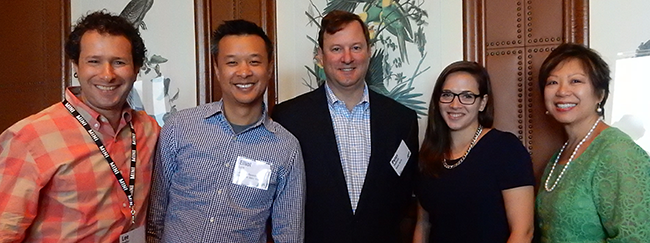
Pictured left to right: The Think Tank’s marketer panelists and Millennial/Boomer experts: Lee Nadler of MINI, Elliot Lum of Sony Music, Peter Hubbell of Boom Agers, Megan Meagher of RPY, and Julie Chan of Pfizer.
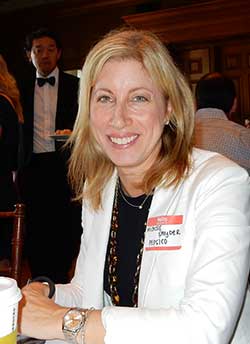
Michelle Snyder, PepsiCo

Alessa Goff and Sloan White, Capital One

Sara Sindelar, IBM

Elizabeth Masarik, Johnson & Johnson
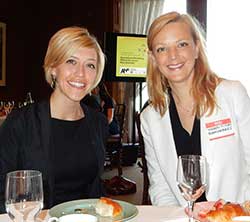
Jessica Bates & Karen Tilson, Bloomingdales

Olga Serna, AT&T
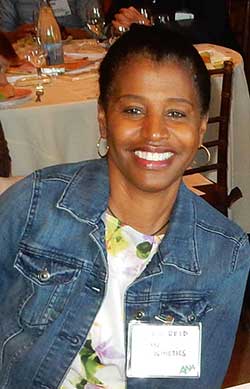
Desiree Reid, IMAN Cosmetics

Karen Clarkson, Visit Britain
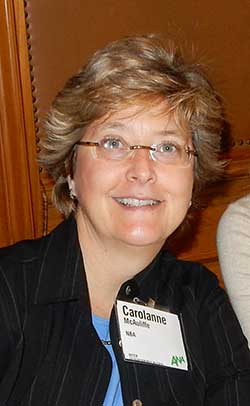
Carolanne, McAuliffe, NBA

Natasha Aarons & Remy Basuri, Verizon Wireless
ABOUT THE INTERNATIONALIST
The Internationalist connects people and ideas in international advertising, marketing and media through content, thought leadership, community and collaboration. It has become a trusted source for international best practices, and is dedicated to the business needs and challenges of international marketing professionals as they participate in multinational brand building. The Internationalist is available in print, online and in-person-- through Think Tanks, Awards and Summits- all to better serve the needs of this community.
The Internationalist is proud of its Global Alliance with ANA (Association of National Advertisers) as we partner on a new initiative called THE INTERNATIONALIST 1000 or 1000 Marketers around the World Reshaping the Future of Marketing. THE INTERNATIONALIST 1000 represents a group of dedicated industry leaders who are reinventing our understanding of marketing’s expanding role throughout the world. The extraordinary efforts of these individuals insure that multinational marketing programs move ahead and make a difference.
Millennials v. Boomers: Marketers Discuss New Ways to Better Understand Society’s Largest Generations
“Millennials” and “Baby Boomers” may be among the decade’s most-used terms in both marketing and in demographics, particularly as the youngest Boomers turn 50 and the oldest Millennials take on new leadership roles. Two such large and pivotal generations have never before been in existence simultaneously. Quintessential examples of these generations—Bill Gates and Mark Zuckerberg-- are redefining our ideas of business at the same time.
Millennials are now the largest living generation and the most coveted consumer group since the Baby Boom. They’ve changed our notions of media, technology and social sharing. Boomers may be marketing’s most valuable generation as their optimism, “can do” attitudes, and purchase power have shaped culture and society forever. And if anyone’s going to redefine, or defy, our concepts of aging, it will be the Baby Boomers.
Earlier this week, The Internationalist and the ANA/Association of National Advertisers presented the first in a series of think tanks on these generations as part of THE INTERNATIONALIST 1000 initiative or 1000 Marketers around the World Reshaping the Future of Marketing. Marketers and experts not only shared insights to better understand and effectively market to these generations, but raised critical questions about how marketing responds to the most enduring values of any generation.
Discussion points included:
- Are the industry’s fundamental targeting models now inappropriate when consumers are living longer and perceiving themselves as “ageless”?
- Do shared passion points create “generation-less” communities of enthusiasts?
- Are there key affinities among these two groups?
- How do iconic brands built in the Baby Boomer era become truly authentic to a new generation of Millennials?
- How will major shifts in the global workforce, longevity, and dependency ratios affect all marketers of brands and services?
The speakers included:
Megan Meagher, Head of Red Peak Branding’s new division RPY (Red Peak Youth), dedicated to helping marketers connect with Millennial consumers. Her research on Millennials uncovered that this generation wants to be understood. They want brands that validate their "persona" and their beliefs. Millennials are more self-aware than self-absorbed. They are confident about who they are, but also fear judgment. Growing up at the dawn of the internet—when all self-expression is via a layer of technology and all messages are essentially permanent-- has fundamentally shaped how Millennials think, act, and express themselves.
Peter Hubbell, Founder of specialist agency Boom Agers for Boomers, and author of The Old Rush: Marketing for Gold in The Age of Aging. Hubbell believes that “Advertising must embrace the ‘Age of Aging.’ There is no consumer trend more important today than aging.” He emphasizes that in just 5 years, half of the US adult population will be 50 and older. Countries from China to Japan, Germany to Russia, South Korea to the UK are showing similar trends. As these valuable consumers age out of the 18-49 media demographic, marketers need to re-prioritize 50+ consumers and re-tool the 18-49 driven systems and processes that dominate current business models. “Like the Gold Rush, the greatest success will come to those who act first. The Old Rush is underway.”
Julie Chan, Senior Director, International Media & Agency Relations at Pfizer Consumer Healthcare. Julie Chan provided consumer insights on the 50+ group with implications for the way we market and advertise—especially in terms of OTC products. Plus, she outlined how Pfizer’s provocative GET OLD campaign spans the generations, encourages people to rethink preconceptions of aging, and look forward to what’s yet to come. Not only does it support a candid conversation about living better, but the project inspires people of all ages to redefine what it means to Get Old in order to break self-imposed and societal limitations, and discover a better quality of life at every age.
Lee Nadler, Director/ Marketing Communications Manager, MINI US. Lee Nadler is responsible for managing unique, multichannel, MINI-centric marketing programs in US that surprise and delight all generations. MINI markets to a psychographic profile or a MINI mindset that is creative, design-oriented, tech-savvy, forward-thinking, culturally-aware, individualist, adventurous, open-minded, curious and engaged in life, and young at heart. The average age of a MINI owner in the US is 46, but Nadler believes the MINI community is linked by shared passions and values, rather than by any specific generational appeal. He recognizes that the role a car plays in life is changing, and MINI is experimenting with new ways to meet the needs of that evolution.
Elliot Lum, VP, Strategic Marketing at Columbia Records division of Sony Music. Elliot Lum has championed research that underscores how a Boomer who went to Woodstock can be as passionate as a 25 year old who regularly downloads. The Sony Music Segmentation Study underscores trends in brand consumption, demographic information, media habits, and music behavior and attitudes among 31,000 customers in 20+ countries. Although music is often first identified with a particular age group or generation, Fanatics, Enthusiasts, Casuals, and Indifferents may better define a relationship with music—no matter the demographic.
In addition, The Internationalist, in collaboration with research company MavenMagnet, analyzed Millennial and Baby Boomer purchase attitudes using big social data. MavenMagnet’s Conversation Research(TM) methodology gained insights from thousands of consumer conversations via dynamic sources of information including blogs, communities, news, forums and social networks over 12 months (June 2013 to May 2014).
Both Millennials and Boomers agree that value for money (vs. cost alone) is the most important factor in a purchase decision. One area where they differed significantly is that Boomers are “INSIDE-OUT” skewed, while Millennials are predominantly “OUTSIDE-IN.” Boomers are more driven by shared values than Millennials, who are more concerned about social appeal.
Aside from common turf on value and quality, Boomers give greatest importance to benefits like personal relevance and individuality-- reflecting inner-directed values. Conversely, Millennials rate social conformance twice as highly as Boomers do. “Fitting-in” is important for Millennials – be it in college, society or when they move into the workplace. Many of their choices are driven by what is considered “right by others.” Boomers are a lot more comfortable with who they are-- they don’t look for social approval. Individuality is important to them and their purchase decisions may or may not conform to social trends.
Held at New York’s Sony Club, and hosted by BBC World News, BrightRoll, Elateral, Financial Times, MediaCom, Reuters, Vertic and The Yomiuri Shimbun, marketing executives from leading brands from around the world were present, including: Acision, American Express, AT&T, AJC, Bloomingdale’s, Boiron, Capital One, Educational Testing Service, Finnair, Gilt Groupe, IBM, IMAN Cosmetics, Johnson & Johnson, Major League Soccer, MINI, NBA, Netherlands Board of Tourism & Conventions, NYC & Company, PepsiCo, Pfizer, Six Flags Entertainment, Sony, Teach for America, The Hartford, US Postal Service, UnitedHealthcare, Verizon Wireless, Visit Britain, and Weight Watchers International.
